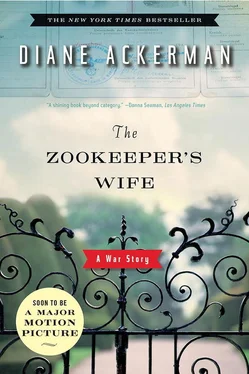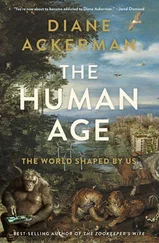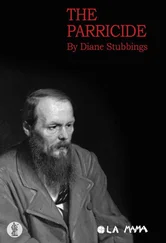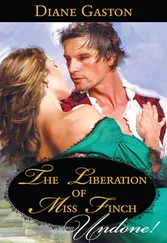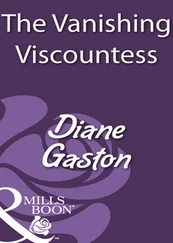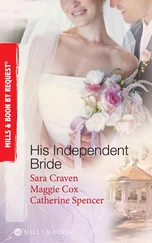Ryś drew her attention to the far side of the room where, to her surprise, disheveled women and children from the neighborhood sat hedged in by shades.
“Dzień dobry, dzień dobry, dzień dobry,” Antonina greeted each woman in turn.
Something about the cozy atmosphere of the lampshade store drew the displaced and bone-chilled to this shop run by grandmotherly ladies willing to share their pantry, coal, and bedding. As Antonina noted,
This lampshade store and workshop was like a magnet to so many people. Thanks to these two tiny lovely old ladies, who were extremely warmhearted, full of love and kindness, we survived this terrible time. They were like the warm light during the summer night, and people from upstairs, homeless people from other locations, from destroyed buildings, even from other streets, were gathering like moths attracted by the warmth around these two ladies.
Antonina marveled as their wrinkled hands passed out food (mainly oatmeal), sweets, a postcard album, and little games. Every night when people chose their spot to sleep, she lay a mattress under a sturdy doorframe and sheltered Ryś with her body, snatching sleep as though falling down a well, as her past grew more idyllic and floated farther away. She had had so many plans for the coming year; now she wondered if she and Ryś would survive the night, if she’d live to see Jan again, if her son would celebrate another birthday. “Every day of our life was full of thoughts of the horrible present, and even our own death,” she wrote in her memoirs, adding:
Our allies were not here, not helping us—we Poles were all alone [when] one English attack on the Germans could stop the constant bombing of Warsaw…. We were receiving very depressing news about our Polish government—our Marshal Śmigly and members of the government had escaped to Romania and were captured and arrested. We felt betrayed, shocked, we were grieving.
When Britain and France declared war on Germany, Poles rejoiced and radio stations played the French and British national anthems endlessly for days, but mid-September brought no relief from the relentless bombing and heavy artillery. “Living in a city under siege,” Antonina wrote disbelievingly in her memoirs, a city full of whistling bombs, jarring explosions, the dry thunder of collapse, and hungry people. First routine comforts like water and gas disappeared, then radio and newspapers. Whoever dared the streets only did so at a run, and people risked their lives to stand in line for a little horsemeat or bread. For three weeks she heard shells zinging over rooftops by day and bombs pounding on walls of darkness at night. Chilling whistles preceded horrible booms, and Antonina found herself listening for each whistle to end, fearing the worst, then letting her breath out when she heard someone else’s life exploding. Without trying, she gauged the distance and felt relief that she wasn’t the bomb’s target, then almost at once came the next whistle, the next blast.
On the rare occasions she ventured out, she entered a film-like war, with yellow smoke, pyramids of rubble, jagged stone cliffs where buildings once stood, wind-chased letters and medicine vials, wounded people, and dead horses with oddly angled legs. But nothing more unreal than this: hovering overhead, what looked at first like snow but didn’t move like snowflakes, something delicately rising and falling without landing. Eerier than a blizzard, a bizarre soft cloud of down feathers from the city’s pillows and comforters gently swirled above the buildings. Once, long ago, a Polish king repelled invading Turks by attaching large feathered hoops to each soldier’s back. As they galloped into battle, the wind coursed through the false wings with a loud tornadic whirring that spooked the enemy’s horses, which dug in their hooves and refused to advance. For many Warsawians, this feather storm may have conjured up the slaughter of those knights, the city’s guardian angels.
One day, after a live shell plunged into her building and stuck in the fourth-floor ceiling, she waited for an explosion that never came. That night, while bombs sprayed smoke ropes across the sky, she moved Ryś to the basement of a nearby church. Then, “in the strangled silence of the morning,” she moved Rhyś back again to the lampshade store. “I’m just like our lioness,” she told the others, “fearfully moving my cub from one side of the cage to the other.”
No news came of Jan, and the worry allowed her little sleep, but she told herself that she would fail him if she didn’t save the zoo’s remaining animals. Were they even alive, she wondered, and could the teenage boys left in charge really look after them? There seemed no choice: though queasy from fear, she left Ryś with her sister-in-law and forced herself to cross the river amid gunfire and shells. “This is how a hunted animal feels,” she thought, caught in the melee, “not like a heroine, just madly driven to get home safely at any cost.” She remembered the death of Jaś and the big cats, shot point-blank by Polish soldiers. Visions of their last moments tortured her, and perhaps a fright harder to dispel: What if they turned out to be the lucky ones?
NAZI BOMBERS ATTACKED WARSAW IN 1150 SORTIES, DEVASTATING the zoo, which happened to lie near antiaircraft guns. On that clear day, the sky broke open and whistling fire hurtled down, cages exploded, moats rained upward, iron bars squealed as they wrenched apart. Wooden buildings collapsed, sucked down by heat. Glass and metal shards mutilated skin, feathers, hooves, and scales indiscriminately as wounded zebras ran, ribboned with blood, terrified howler monkeys and orangutans dashed caterwauling into the trees and bushes, snakes slithered loose, and crocodiles pushed onto their toes and trotted at speed. Bullets ripped open the aviary nets and parrots spiraled upward like Aztec gods and plummeted straight down, other tropicals hid in the shrubs and trees or tried to fly with singed wings. Some animals, hiding in their cages and basins, became engulfed by rolling waves of flame. Two giraffes lay dead on the ground, legs twisted, shockingly horizontal. The clotted air hurt to breathe and stank of burning wood, straw, and flesh. The monkeys and birds, screeching infernally, created an otherworldly chorus backed by a crackling timpani of bullets and bomb blasts. Echoing around the zoo, the tumult surely sounded like ten thousand Furies scratching up from hell to unhinge the world.
Antonina and a handful of keepers ran through the grounds, trying to rescue some animals and release others, while dodging injury themselves. Running from one cage to the next, she also worried about her husband, fighting at the front, “a brave man, a man of conscience; if even innocent animals aren’t safe, what hope has he?” And when he returned, what would he find? Then another thought collided: Where was Kasia, the mother elephant, one of their favorites? At last she arrived at Kasia’s enclosure, only to discover it leveled and her gone (already killed by a shell, Antonina would later learn), but she could hear two-year-old baby Tuzinka trumpeting in the distance. Many monkeys had died in a pavilion fire or were shot, and others hooted wildly as they scampered through the shrubs and trees.
Miraculously, some animals survived at the zoo and many escaped across the bridge, entering Old Town while the capital burned. People brave enough to stand by their windows, or unlucky enough to be outside, watched a biblical hallucination unfolding as the zoo emptied into Warsaw’s streets. Seals waddled along the banks of the Vistula, camels and llamas wandered down alleyways, hooves skidding on cobblestone, ostriches and antelope trotted beside foxes and wolves, anteaters called out hatchee, hatchee as they scuttled over bricks. Locals saw blurs of fur and hide bolting past factories and apartment houses, racing to outlying fields of oats, buckwheat, and flax, scrambling into creeks, hiding in stairwells and sheds. Submerged in their wallows, the hippos, otters, and beavers survived. Somehow the bears, bison, Przywalski horses, camels, zebras, lynxes, peacocks and other birds, monkeys, and reptiles survived, too.
Читать дальше
